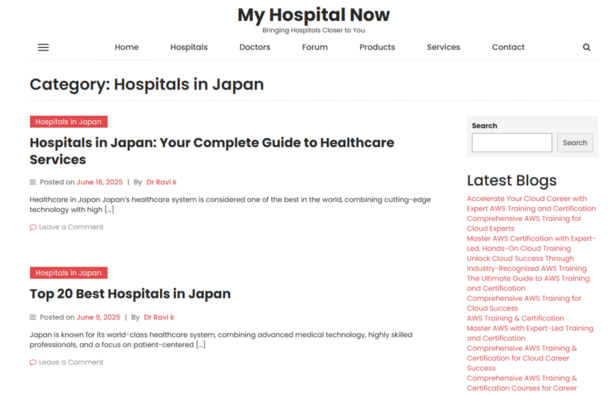
Why Japan Is the New Global Hotspot for Medical Tourism
Imagine traveling to a country where ultra-modern hospitals, digital medical records, and Nobel-level research blend with ancient hospitality, on-time appointments, and serene environments. That’s the reality for thousands of international patients choosing Japan as their preferred destination for world-class medical care.
Against the backdrop of iconic cherry blossoms and forward-thinking cities, Japan has quietly risen to the very top of global hospital rankings. Today, foreign patients benefit from breakthroughs in robotic surgery, oncology, regenerative medicine, and advanced diagnostics—often at surprisingly manageable costs and with some of the shortest specialist wait times in the developed world. Add in a culture that deeply values respect, treatment transparency, and mind-body recovery, and you have a destination where healing is holistic and journeys are streamlined.
Whether you’re a professional exploring referral options, an enthusiast searching for innovative care, or a patient curious about the best hospitals in Japan, this guide from MyHospitalNow.com delivers everything you need. We cover step-by-step planning, must-know stats, expert tips, international desk access, patient experiences, and practical travel notes—setting you up for a genuinely worry-free health journey in the Land of the Rising Sun.
Table: Japan’s Leading Hospitals and Specializations
| Hospital Name | City | Beds | Doctors | Key Specialties | International Patient Services |
|---|---|---|---|---|---|
| University of Tokyo Hospital | Tokyo | 1,217 | 2,000+ | Oncology, Cardiac, Neurosurgery, General | International Center, English Desk |
| St. Luke’s International Hospital | Tokyo | 539 | 1,130+ | Cardiac, Surgery, Cancer, Women’s Health | English, Russian, Family Interpreter |
| Kyoto University Hospital | Kyoto | 1,121 | 1,700+ | Neurosurgery, Rare Therapies, Research | Concierge for Internat’l Patients |
| Osaka University Hospital | Osaka | 1,082 | 1,500+ | Organ Transplant, ICU, Cardiac | Bilingual Services, VIP Units |
| Kameda Medical Center | Kamogawa | 917 | 1,200+ | Cardio, Cancer, Digestive, Ortho, IVF | JMIP-accredited, Concierge |
| Nagoya University Hospital | Nagoya | 1,042 | 1,200+ | Oncology, Transplant, Research | Medical Interpreters, Intl. Desk |
| National Cancer Center | Tokyo/Osaka | 1,000+ | 1,250+ | Cancer, Rare Tumors, Immune Therapy | English, Multilingual Support |
Step-by-Step Medical Tourism in Japan: What Patients Need to Know
1. Research and Shortlist
- Begin at MyHospitalNow’s Japan hospital directory for verified hospital data, doctor profiles, accreditations (JMIP, JCI), and specialties.
- Shortlist based on your needs: top cancer/oncology at University of Tokyo or NCC; fertility/IVF at Kameda; cardiac surgery at St. Luke’s or Kyoto.
2. Document Submission and Booking
- Prepare all recent scans, reports, and referring physician notes (accepts English or translated documents). Email these to the hospital’s International Center.
- You’ll receive a pre-treatment interview (often via video), second-opinion evaluation, and clear written cost estimate.
3. Visa & Logistics
- Request a medical stay visa—Japan requires a Certificate of Identity from an accredited medical coordinator or international desk.
- Hospitals can assist with airport pickup, translation, private accommodation, and interpreter services.
4. Arrival & Treatment
- Meet your international liaison. They manage appointments, translation, and insurance billing.
- Patient-centric design (from private rooms to healing gardens and onsen options) makes recovery smoother.
- Receive multidisciplinary care—surgeons, international nurses, dietitians, and translators.
5. Aftercare & Telehealth
- Get digital discharge summaries, detailed aftercare instructions, and post-travel virtual checkups.
Surprising Stats & Strategies
- Japan ranks top 10 globally for hospital and provider quality in 2025—with University of Tokyo, Kyoto University, and St. Luke’s among Asia’s top five.
- Success rates for cancer and cardiac surgery rival the US/Germany—often with faster scheduling for second opinions.
- Each year, Japan’s international medical programs serve over 15,000 foreign patients with customized, English-language documentation and care.
- Popular with Chinese, Vietnamese, Russian, and Indonesian patients—thanks to streamlined care coordination and cross-border wellness packages.
- Specialist interpreter services and hospital-based international clinics are growing fast: St. Luke’s, Kameda, and Nagoya now offer full expat/family support.
Actionable Tips and Insider Advice
- Always request a hospital-issued, all-inclusive quote and written care plan in advance.
- Confirm your insurance coverage and check if your home provider partners with Japanese hospitals (many do for cancer/rare therapies).
- Book extra days: Recovery in Japan often includes holistic add-ons like onsen hot springs or traditional nutrition—ask your coordinator!
- Immigration: Medical stay visas are typically processed in 2–3 weeks with hospital documentation support.
Pro Story: A Real-World Patient Journey
“When my father needed complex heart surgery, we chose St. Luke’s International Hospital after consulting MyHospitalNow. Everything from airport pickup to interpreter services was prearranged. The team consulted our home cardiologist and even organized vegetarian meal plans. His surgery and aftercare mirrored global best standards—for less than half US prices, plus Tokyo’s unique blend of culture and wellness.”
FAQ: What International Patients Ask Most
Are international staff and interpreters available?
Yes—most top hospitals have certified medical interpreters for English, Russian, Chinese, and Arabic (and help with travel, consular paperwork, and local navigation).
What can families expect?
Family accommodation, visitor access, and counseling support are standard, especially for serious/long treatments.
Can I combine treatment with Japan’s wellness traditions?
Absolutely—some hospitals and wellness hotels offer onsen use, relaxation therapies, or cultural tours as safe post-procedure recovery options.
Why Choose MyHospitalNow?
With MyHospitalNow’s Japan hospital guide, comparing, booking, and planning your best medical care in Japan is faster, safer, and backed by real patient testimonies. From the first search and paperwork to aftercare and follow-ups—MyHospitalNow is your trusted partner for a seamless, life-enhancing health journey in one of the world’s best hospital systems.